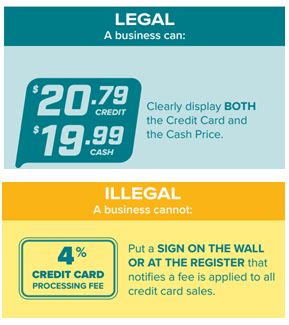- with readers working within the Property industries
- within Finance and Banking topic(s)
On February 11, 2024, a new law went into effect in New York, establishing important limits and rules for surcharging. Enacted in December 2023, the new statute has a price disclosure component, detailing how surcharge prices are communicated, and a surcharge price cap component. The law also imposes a $500 civil penalty for each violation, and it can be enforced by municipalities and local governments.
Surcharge Price Disclosure: First, the law provides that any seller imposing a surcharge must "clearly and conspicuously post the total price for using a credit card in such transaction, inclusive of [the] surcharge[.]" This means that the final sales price of any such transaction cannot be greater than the posted price. It would not be sufficient to include a credit card surcharge warning on a price tag or menu, or on a sign by the register.
Surcharge Price Cap: Second, the law provides that any such surcharge may not exceed the amount of the surcharge charged to the business by the credit card company for such credit card use.
Two-Tier Pricing Permitted: Finally, the new law explicitly states that it does not prohibit merchants from offering a two-tier pricing system, which is defined as the posting of two different prices in which the credit card price, inclusive of any surcharge, is posted alongside the cash price.
To help businesses comply with the new law, the Consumer Protection Division of the New York Department of State issued new guidance materials with examples of permitted and prohibited surcharging practices. Guidance for businesses on how to comply with the law can be found here, and examples of credit card surcharge violations can be found here.

Source: Department of State, Consumer Protection Division, Credit Card Surcharge Guidance (February 11, 2024).
New York's two-tier pricing approach is unlike the laws of other states that regulate or limit surcharging. For example, New Jersey recently enacted a surcharge law that requires the seller to disclose the amount of the surcharge prior to the transaction by posting clear and conspicuous notice on a sign at the point of entry and point of sale. Minnesota has a similar requirement. But this practice would not be sufficient under New York's surcharge law.
New York's unique approach likely stems from Expressions Hair Design v. Schneiderman, a case litigating New York's previous surcharge statute that was never fully resolved. In Expressions Hair Design, the plaintiffs wanted to implement a single-sticker pricing scheme and challenged the New York law on constitutional grounds. Single-sticker pricing is the practice of listing a single price (e.g., $10) for a good or service and indicating that an additional charge for using a credit card would apply (either an amount or percentage), for example, listing a price as "$10, with a 3% credit card surcharge."
Initially, the district court held that the prohibition violated the First Amendment. The Second Circuit reversed, holding that the law regulated conduct, not speech, and that it prohibited the single-sticker pricing scheme that the plaintiffs desired to implement. The U.S. Supreme Court reversed and remanded, holding that the prohibition regulated speech, but leaving it to the Second Circuit to decide whether the regulation of speech was constitutional. The Second Circuit subsequently asked the New York Court of Appeals to clarify the pricing practices that the law prohibited.
The New York Court of Appeals clarified that, although the state's surcharge prohibition would apply to single-sticker pricing, it would not apply if a merchant posted the total dollars-and-cents price charged to credit card users alongside the cash price, even if the higher price for credit card users is explained as a surcharge.
Once the New York Court of Appeals clarified that the state's surcharge prohibition did not prohibit merchants from posting the total dollars-and-cents price charged to credit card users, the plaintiffs withdrew their claims, and the Second Circuit dismissed the appeal as moot without resolving the constitutional issue.
After the Expression Hair Design case, New York adopted the framework established by the New York Court of Appeals and issued guidance indicating that merchants could implement a surcharge by posting the full dollars-and-cents credit card price alongside the cash price. New York's new surcharge law continues this two-tier pricing approach.
New York is not the only state eyeing surcharges; at least eight states have introduced surcharge-related legislation in 2024. And state law is not the only consideration driving surcharging practices. The major card networks also impose strict rules on surcharging that merchants must follow or face fines from the card networks and acquiring banks.
To stay on top of these developments, bookmark our All About Advertising Law blog and subscribe to our monthly newsletter. To learn more about Venable's Advertising Law services, click here. Listen to the Ad Law Tool Kit Show—a new podcast from Venable.
The content of this article is intended to provide a general guide to the subject matter. Specialist advice should be sought about your specific circumstances.



